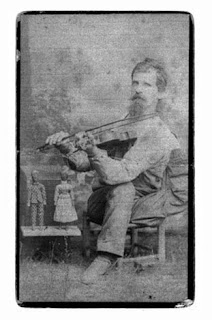In my years of researching our family, a few individuals stand out as having overcome severe personal challenges. They are people who had to endure hardships that most of us would find hard to fathom.
Willie Davis Russell. I have always admired and respected my uncle Bill Russell (1908-1997) for the way he dealt with the loss of a leg to bone disease as a young adult. Despite the difficulty of being an amputee, Uncle Bill was a good humored individual. Whenever our family gathered he enjoyed the occasion. I remember how he would sit down next to one of us kids, and very discreetly take our hand and put in on his knee. The child would be shocked at the hard plastic feel of his prosthesis. He got quite a kick out of surprising kids that way. After all these years, I must say, that behavior now seems a bit creepy to me, but that was Uncle Bill.
 |
| Uncle Bill Russell with wife Pauline Shepard Russell, 1978 |
Peggy Ann Gray Shannon. A second ancestor who had to deal with serious personal hardship was Peggy Ann Gray (1829-1899), the Grandmother of my Grandmother Nola Shannon Gower. In 1864 her husband David Reid Shannon died in Louisiana while fighting for the confederacy in the Civil War. He left her as a widow with 7 children: Mary Ann (16), William (14), James (12), Richard (11), Sarah (9), Margaret (2), and Sam (5). What an incredible hardship, to be left with 7 children and no husband, in Wartime, far from home. I cannot imagine a more desperate situation for a young mother. Select this link for more about the life story of David Reid Shannon. Thankfully Peggy's father and brothers eventually came to her rescue. They traveled over 400 dangerous miles from northeastern Mississippi during the height of the Civil War to their daughter and sister in rural southern Louisiana. They gathered up Peggy and her children and moved them another 400+ miles to Stone County, Arkansas where they started a new life. Peggy's story is not only about her strength and courage amidst great adversity. It is also about the way it brought out the best in her family who responded to her plight.
Henry William Cooper. Perhaps the most amazing story of personal adversity among our ancestors concerns a distant cousin of my mother Maida Gower Shepard. Henry William Cooper (1852-1906) was born and raised in Newnata, Stone County, Arkansas, the same community where my mother was born in 1924. Henry was born without the use of his legs. It was obviously a disability that made life extremely difficult for him and his family. 
Henry William Cooper
1852-1906
Though he went through life without the use of his legs, he became proficient using his hands. He had a workshop where he made chairs, baskets, brooms, dolls and puppets. The old picture at the left shows him playing the fiddle and operating dancing dolls he had made himself. He also made a cart on which he could get around, using wooden blocks to propel himself. (Thanks to the Stone County History Museum in Mountain View, Ark. for this old photo.)
At 25 Henry married Margaret Parlee Anderson and with her bore and raised a family of 9 children.
When people write about our ancestor Henry Cooper they mention his similarity to the famous French Artist Toulouce Lautrec (1864-1901), a contemporary of Cooper. Lautrec was without the full use of his legs and, like our cousin Cooper, compensated for his infirmity by being extraordinarily creative.
Here then are three remarkable people in our family tree who overcame great hardships. They responded to their adversity with determination, fortitude and hard work. They are people whose DNA we share, and who inspire us to be as resilient as they were.
- - -
Steve Shepard
(he/him/his)


